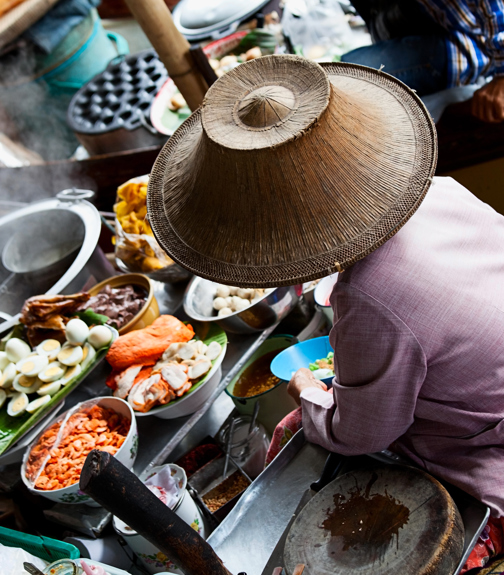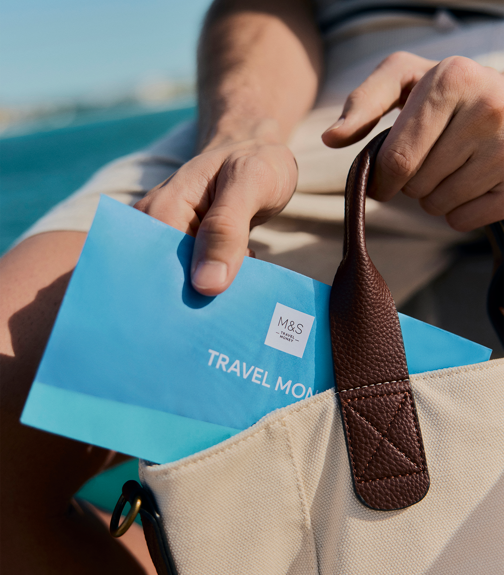How to buy Thai Baht
-
Buy Thai Baht Online
Buy Thai Baht online with Click & Collect at over 580 M&S stores. Use our Pounds to Thai Baht (GBP to THB) currency calculator to work out how many Thai Baht you want. Pick your collection date and collect from your chosen M&S store.
Click & Collect Thai Baht (THB) in as little as 60 seconds.*
*Subject to availability
-
Buy Thai Baht In-store
Buy Thai Baht in your local participating M&S store.* With over 90 Travel Money Bureaux nationwide - many open seven days a week. - you can buy Thai Baht at a time that suits you.
*In-store rates may differ from online rates.

Why buy Thai Baht from M&S Travel Money?
Get your relaxing Thailand trip off to a smooth start with M&S Travel Money, where ordering Thai Baht is simple.
- Our Thai Baht rate has no hidden fees & zero commission
- Click & Collect Thai Baht the same day*
- Stores open 7 days a week**
- Get more with Sparks Preferential Rates
**store opening hours vary

What you need to know about the Thai Baht currency
The Thai Baht is the official currency of Thailand and its currency code is THB. It's made up of 100 Satang to a Baht, with prices displayed using the symbol ฿. The currency comes in both coins and banknotes.
Coins include:
25 Satang, 50 Satang, 1 Baht, 2 Baht, 5 Baht, 10 Baht
Thai Baht banknotes come in the following denominations:
20 Baht, 50 Baht, 100 Baht, 500 Baht, 1,000 Baht
You can buy Thai Baht by visiting a participating store, or online using our Click & Collect service.
^^Please note not all denominations are available to exchange.

Guide to Thailand
Thailand is one of the most popular tourist destinations in the world, and it's easy to see why.
With nearly 1000 islands and around 1500 miles of coastline, spectacular beaches, dramatic landscapes and lush tropical forests, there’s something for everyone in Thailand.
If Buddhist temples, buzzing street markets, incredible cuisine, friendly and welcoming locals and a nightlife scene like no other sound like your thing, it’s time to start planning your Thai adventure.
Frequently asked questions
Credit and debit cards are widely accepted in tourist and urban areas of Thailand, but this shouldn’t be relied on. Be sure to travel with cash Travel Money so you always have a way to pay, especially in the nation’s many remote spots, where card payments are less likely to be accepted.
The Thai Baht is the official currency of Thailand. You may occasionally be able to spend US Dollars, but this shouldn’t be relied on.
If you're just travelling to Thailand for a holiday, British passport holders will be able to enter the country without a visa and stay for up to 30 days. For longer stays, or if you're planning on working while you're in Thailand, you’ll need to apply for a visa before you travel.
You should always research the most up to date visa guidelines before planning a trip.
Tipping in Thailand is normal in restaurants, where adding 10% to your bill for good service is standard. Tips are not generally expected in other situations, but are usually appreciated.
For taxi fares, you might round up to the nearest ten Baht, for example if your fare was ฿64, you could pay ฿70. For other services like tour guides, spa attendants or porters, it’s really up to you if you want to give a tip.
The official language of Thailand is the Thai language. However, English is widely spoken in the main tourist areas and is used as an unofficial second language across the country. Many maps, road signs and menus will also have an English translation.
Before you book your trip to Thailand, check the Foreign, Commonwealth & Development Office for the latest travel advice.
The government might occasionally advise against visiting certain regions of Thailand, which can affect your travel insurance.
High season in Thailand is from November to March. This is after the monsoons, and generally brings settled, more manageable temperatures than the hotter period from March to June.
The wet season is from July until October. While downpours are common during monsoon season, they don't last long so you'll usually be able to get back onto the beach if you wait it out.
Planning your Thai adventure? Check out the latest exchange rate for Thai Baht and order your Travel Money.
Yes, it's best to get your Thai Baht before your trip, as exchanging currency at the airport could result in poor exchange rates.
Thailand is the only country where the Thai Baht can be used.
Other popular currencies
If you are planning a future holiday or a trip that takes in multiple destinations, these other currencies may be useful:


